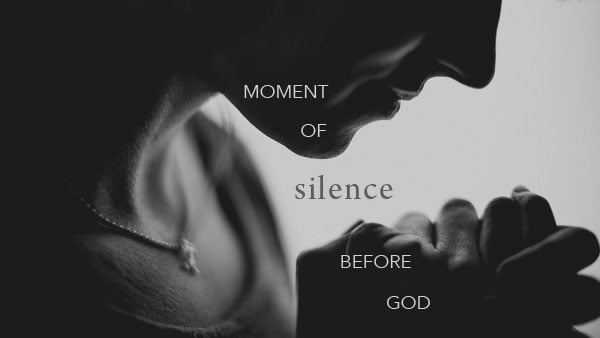
by Brian Rhea
(originally posted at the Seedbed Worship Design Collective)
Every Sunday morning, after a hymn of praise and praying a Collect together, the churches I serve have a “moment of silence before God.” I conclude the silence with an extemporaneous prayer, usually inviting God to encounter us during our worship service. I’ve never timed how long the silence lasts—and it probably varies week to week—but I wait until it feels uncomfortable, and then wait some more. It may be the only time each week that our children are that quiet! While there’s usually a little bit of rustling or coughing, we have a genuine moment of stillness.
Long ago, during my first pastorate, I left the worship service one morning with the sinking feeling I’d not offered any space for people to meet God. Oh, I hoped they would meet God during the hymns we sang or the sermon I preached or the Scriptures we’d read—but there was no rest from the activity of the service. Content was constant. And while I had carefully prepared that content, while I’d arranged those Scriptures and hymns and sermon as a unified whole to offer a focused Word from God, there was no breathing room. There was no opportunity to allow that content to sink in, no place to meditate on that content; and there was certainly no space to meet God outside the bounds of my carefully crafted service. After that realization, I tried regularly including a place for silent prayer, usually with the pianist playing quietly.
Some years later I became an associate pastor at a large church where, unless I was preaching, I was handed the order of worship I was expected to lead. That first Sunday, I saw there was a “moment of silence” after the opening prayer. So, to be an obliging associate, we were silent. After the service a couple thanked me. “You actually led us in a true moment of silence! Not just a few seconds, but a real, deep silence!” They were from a Quaker background, and the church itself was in a town founded by Quakers. The idea of beginning worship with silence was new to me, but I now deeply treasure it.
Silence gives us space to pray as we have need. Silence allows us to center ourselves and prepare to meet with God. Silence calls us out of the noise of the world and acts as a threshold into the holy space of worship. Silence molds us into an attitude of humility before our Creator—being slow to speak and quick to listen (James 1:19).
This silence is not a void; it is not empty of content. Eastern religions privilege an emptying of one’s mind (for in silence we can realize there is essentially no distinction between our own selves, the universe, or deity), but for Judaism and Christianity silence is about space to fill one’s mind properly. We meditate on Torah, God’s instruction for us (Joshua 1:8; Psalm 1:2). We become still, in order to know that the LORD is God (Psalm 46:10). We let silence drown out the wind, earthquake, and fire, because God is present in the voice of sheer silence (2 Kings 19:12).
Likewise, our “moment of silence before God” in Sunday morning worship is not meant to be completely void of content. We have just prayed a Collect and invoked the Trinity, so we are aware of which God we are being silent before. Prior to the Collect we stood and sang a hymn praising this God; prior to the hymn we heard words from Scripture calling us to worship this God. Our silence is space, but it is intentional space—space directing us toward the One who, in the midst of primeval silence, spoke the words “Let light be,” and it was. What word of new creation might that One speak into our present silence?
I see our moment of silence before God as a necessary call to attention, and space enabling that attention. I should probably incorporate silence, or at least reflective space, elsewhere in the service on a regular basis. Some reasons—which could all become articles in their own right!—include:
- Silence is Biblical. It’s Biblical not simply because some Scripture passages exhort silence (Habakkuk 2:20; Zephaniah 1:7; Zechariah 2:13; cf. Ecclesiastes 5:1-2), but because silence was an integral part of Temple worship (cf. the Letter of Aristeas 92-95).
- Silence is traditional. It has long been part of Christian prayer in monastic practice, especially in the Hesychast {Eastern Orthodox] tradition.
- Silence is necessary for human health. Science shows the need for silence, as a quick internet search will demonstrate.
- Silence is counter-cultural. Our world has a love affair with noise. We love the sound our own voices. We also know that sound is safer than silence. Noise insulates us from pondering spiritual realities. We can cheerfully move from distraction to distraction and ignore our obligations to our Creator.
- Silence expresses our dependence on God. The weekly Sabbath proclaimed to the antagonistic nations that human striving could not achieve human potential; God alone is the ground of our being. So, too, a moment of silence testifies to the inadequacy of our words. God is the Word before whom all speech falls mute.
--Brian pastors Fourth United Methodist Church in Millville, New Jersey. He and his wife Jan have three young children. He's studied Scripture at Asbury Seminary, Princeton Seminary, and Boston College. This blog was originally published on July 20, 2015 on the Worship Design Collective website which has graciously granted us permission to re-post. For more, go to worshipdesigncollective.seedbed.com/
--For more great articles about worship service planning, check out www.discoverworship.com.










